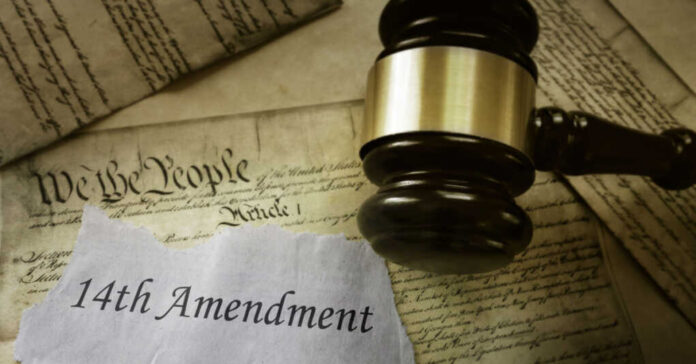
As Maine follows Colorado in deciding to bar former President Donald Trump from the ballot, Democrats characterize the victory as “upholding democracy.” At the same time, Republicans caution that the measures will add chaos to the electoral process.
Maine and Colorado both based their decisions on an obscure, post-civil war clause added to the 14th Amendment of the Constitution. Section 3 of the 14th Amendment addresses the issue of individuals who have engaged in insurrection or rebellion against the U.S. government. Added in 1868, it intended to bar former Confederacy leaders, pardoned by the president, from holding office to prevent those who engaged in rebellion against the U.S. from returning to positions of power.
The clause reads, “No person shall be a Senator or Representative in Congress, or elector of President and Vice President, or hold any office, civil or military, under the United States, or under any State, who, having previously taken an oath, as a member of Congress, or as an officer of the United States, or as a member of any State legislature, or as an executive or judicial officer of any State, to support the Constitution of the United States, shall have engaged in insurrection or rebellion against the same, or given aid or comfort to the enemies thereof. But Congress may, by a vote of two-thirds of each House, remove such disability.”
Fast forward to 2023, when everyone thinks they are a constitutional lawyer. Democrats are applauding the inability of Trump supporters to vote for Biden’s political adversary. Republicans argue that Colorado and Maine are wildly misinterpreting the 14th Amendment for political gain.
The issue will move quickly to the United States Supreme Court, which must interpret the Amendment to see if it can be used to disqualify former President Donald Trump from appearing on ballots. Three main concerns are central to the issue: who is disqualified from holding office, is the president an “officer” of the United States, and did Trump’s actions enable an “insurrection?”
The Democrats love to use the term “insurrection” because it sounds better than “protest.” By definition, an “insurrection” did not occur on January 6, 2021. An “insurrection” is a violent uprising by a group seeking to overthrow or resist the established government or authority through force. The vast majority of protestors were only there to, as Trump pleaded in his speech just before the incident, “peacefully march to the Capitol” to “let their voices be heard.” But the media clings to the term “insurrection,” hoping it will be normalized, universally adopted, and automatically equated to the January 6 incident.
So, did Trump’s actions incite an insurrection? His election interference case will see him characterized as the leader of an armed revolution and will also see a revisionist definition of the word “insurrection.” He will likely face conviction once the biased court can repaint the truth. Once he is convicted, as inevitably will happen because the Democrats refuse to offer him a fair trial, the Amendment may block him from appearing on ballots as long as the other issues surrounding its application to Trump are resolved.
But even that won’t be enough on its own. Disqualifying Trump under the 14th Amendment will depend on one central issue: is he qualified to be disqualified in the first place?
Doron Kalir, a professor at Cleveland-Marshall College of Law, said that Section 3 of the 14th Amendment applies to various positions, including senators or representatives in Congress, electors of the president and vice president, officers in civil or military roles, and individuals who have taken oaths as members of Congress, officers of the United States, or members of State legislatures.
According to Kalir’s interpretation, despite the title “commander in chief,” the president does not hold an official station within the U.S. military, nor is he considered a civilian.
Similarly, while the term “president” is not explicitly mentioned, it raises the question of whether the former president qualifies as an “officer of the United States.” Kalir points out that in a 2010 SCOTUS ruling, Free Enterprise Fund v. Public Company Accounting Oversight Board, Chief Justice John Roberts stated that elected officials are not considered “officers of the United States” because they are not appointed.
Unsurprisingly, 63% of Democrats in a recent poll supported Colorado and Maine in removing Trump from the ballot, with only a quarter of Republicans backing the resolution. Around 48% of Independents agree with the states’ decisions.
But 43% of participants believe SCOTUS will overturn the decision, meaning that many of those currently applauding the resolution have no concerns over the constitutionality of it – they blindly support any measure that would remove Trump from the 2024 race.







